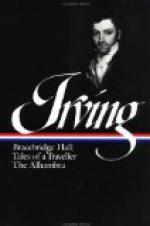The parson, I am told, has been for some time meditating a commentary on Strutt, Brand, and Douce, in which he means to detect them in sundry dangerous errors in respect to popular games and superstitions; a work to which the squire looks forward with great interest. He is also a casual contributor to that long-established repository of national customs and antiquities, the Gentleman’s Magazine, and is one of those that every now and then make an inquiry concerning some obsolete customs or rare legend; nay, it is said that several of his communications have been at least six inches in length. He frequently receives parcels by coach from different parts of the kingdom, containing mouldy volumes and almost illegible manuscripts; for it is singular what an active correspondence is kept up among literary antiquaries, and how soon the fame of any rare volume, or unique copy, just discovered among the rubbish of a library, is circulated among them. The parson is more busy than common just now, being a little flurried by an advertisement of a work, said to be preparing for the press, on the mythology of the middle ages. The little man has long been gathering together all the hobgoblin tales he could collect, illustrative of the superstitions of former times; and he is in a complete fever lest this formidable rival should take the field before him.
[Illustration: A Bookworm]
Shortly after my arrival at the Hall, I called at the parsonage, in company with Mr. Bracebridge and the general. The parson had not been seen for several days, which was a matter of some surprise, as he was an almost daily visitor at the Hall. We found him in his study, a small, dusky chamber, lighted by a lattice window that looked into the churchyard, and was overshadowed by a yew-tree. His chair was surrounded by folios and quartos, piled upon the floor, and his table was covered with books and manuscripts. The cause of his seclusion was a work which he had recently received, and with which he had retired in rapture from the world, and shut himself up to enjoy a literary honeymoon undisturbed. Never did boarding-school girl devour the pages of a sentimental novel, or Don Quixote a chivalrous romance, with more intense delight than did the little man banquet on the pages of this delicious work. It was Dibdin’s Bibliographical Tour; a work calculated to have as intoxicating an effect on the imaginations of literary antiquaries, as the adventures of the heroes of the Round Table on all true knights; or the tales of the early American voyagers on the ardent spirits of the age, filling them with dreams of Mexican and Peruvian mines, and of the golden realm of El Dorado.
The good parson had looked forward to this bibliographical expedition as of far greater importance than those to Africa, or the North Pole. With what eagerness had he seized upon the history of the enterprise! With what interest had he followed the redoubtable bibliographer and his graphical squire in their adventurous roamings among Norman castles and cathedrals, and French libraries, and German convents and universities; penetrating into the prison-houses of vellum manuscripts and exquisitely illuminated missals, and revealing their beauties to the world!




